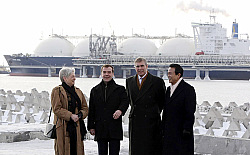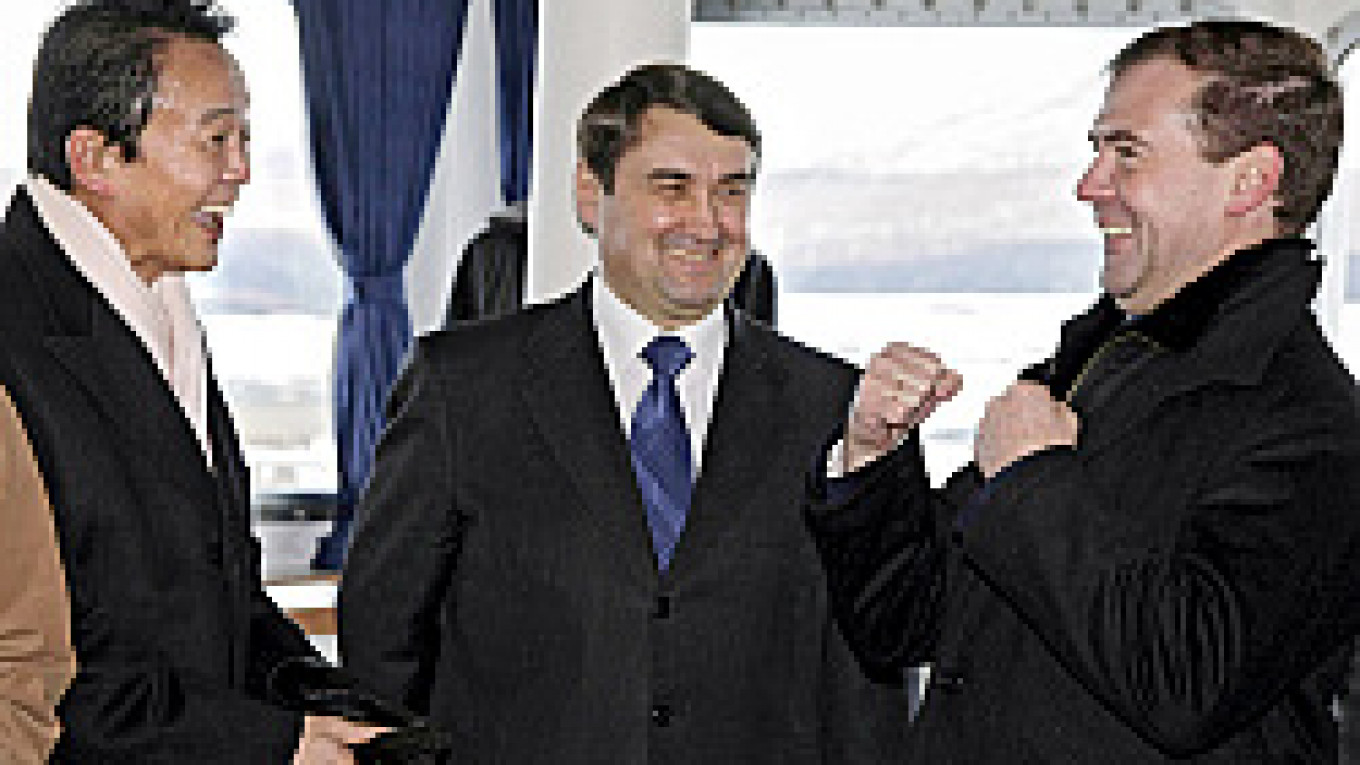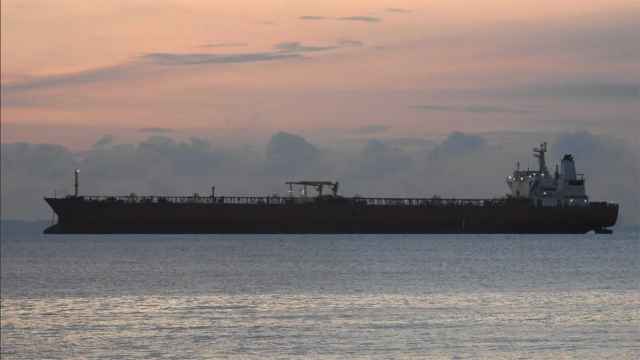Gazprom, which relies for most of its revenues on European Union sales, is gaining access to the lucrative Asian Pacific market through its control of the multibillion-dollar Sakhalin-2 joint venture that includes the plant.
President Dmitry Medvedev and Japanese Prime Minister Taro Aso looked on as chief executives of the venture's members Gazprom, Royal Dutch Shell, Mitsui and Mitsubishi pressed a symbolic brick-sized button to launch the plant on a makeshift stage inside one of its facilities.
"All this, beyond any doubt, strengthens our position, the position of Russia, as the biggest player on the energy market," Medvedev said at the ceremony. "I will not conceal it: We are very much delighted about that."
The plant will add 5 percent to the global supply of liquefied natural gas, or gas cooled off to become liquid, when it ramps up to its full annual capacity of 9.6 million tons next year. The Grand Aniva tanker, with white semi-spherical tops of reservoirs rising from its deck, is waiting to set sail from this port in March with the first shipment of gas.
Sakhalin Energy Investment Co., the operator of the Sakhalin-2 project, will sell 65 percent of the gas to Japan, the fuel's biggest market. North America will take 20 percent of the supply, with South Korea consuming the rest.
Produced off of Sakhalin and piped to the plant, the gas will eventually account for 8 percent of Japan's consumption. "Having such an energy source was our dream for many years," Aso said, speaking after Medvedev. "Russia is becoming a constructive partner in this region. Japan welcomes Russia in this capacity."
Aso said cooperation with Russia would help resolve a dispute over the four Russian-controlled Kuril Islands that are claimed by Japan.

Mikhail Klimentyev / ria-novosti
Maria van der Hoeven, Dmitry Medvedev, Prince Andrew and Taro Aso posing in front of The Grand Aniva tanker.
| |
"We would like to be able to continue to invest in Russia for the long-term, as we see ... Russia as a good partner to work with," Prince Andrew said. "Also, we see Russia as a secure supplier of energy."
He spoke a month after Russia and Ukraine ended a bitter gas dispute that disrupted supplies to Europe for weeks, leaving many people shivering in the cold and industries at a standstill.
Gazprom took control over Sakhalin-2 from Shell in 2007 after sustained pressure from the federal government over alleged environment violations.
Senior executives from Mitsui and Mitsubishi were appreciative of Gazprom's clout Wednesday. "Thanks to their strong support, and also sometimes support to convince the local government and central government of Russia to clear various permissions, this project started [progressing] very smoothly," Mitsui chief Shoei Utsuda said at a news conference. "I understand the Gazprom role for this project is huge."
Mitsubishi chief Yorihiko Kojima said Gazprom's participation made the government more supportive. "Maybe it's another reason why we can celebrate the inauguration ceremony today," he said.
Gazprom's most prominent contribution was lending its expertise in constructing pipelines that run along the spine of the island, connecting oil and gas fields in the north to an oil terminal and the LNG plant in the south, Gazprom deputy chief Alexander Medvedev said.
All gas from the plant has been committed for the next 20 years.
A Message from The Moscow Times:
Dear readers,
We are facing unprecedented challenges. Russia's Prosecutor General's Office has designated The Moscow Times as an "undesirable" organization, criminalizing our work and putting our staff at risk of prosecution. This follows our earlier unjust labeling as a "foreign agent."
These actions are direct attempts to silence independent journalism in Russia. The authorities claim our work "discredits the decisions of the Russian leadership." We see things differently: we strive to provide accurate, unbiased reporting on Russia.
We, the journalists of The Moscow Times, refuse to be silenced. But to continue our work, we need your help.
Your support, no matter how small, makes a world of difference. If you can, please support us monthly starting from just $2. It's quick to set up, and every contribution makes a significant impact.
By supporting The Moscow Times, you're defending open, independent journalism in the face of repression. Thank you for standing with us.
Remind me later.






